Compared to grading tech gadgets, rating cars is notoriously tricky. With a variety of classes (SUV, Sedan, Hatchback, Coupe, Wagon, etc.), subclasses (Compact, Midsize, Full-size, etc.) and driver preferences (performance, safety, appearance, fuel efficiency and so forth), it’s impossible to create a true top 10 or name the overall best auto of the year. In a famous post, Malcolm Gladwell critiqued Car and Driver for its “ambition to grade every car in the world according to the same methodology.”
At FindTheBest, we’re not foolish enough to name a best overall automobile, but we are crazy enough to present a single methodology for our Smart Rating. With apologies to Mr. Gladwell, here is our humble attempt:
Methodology
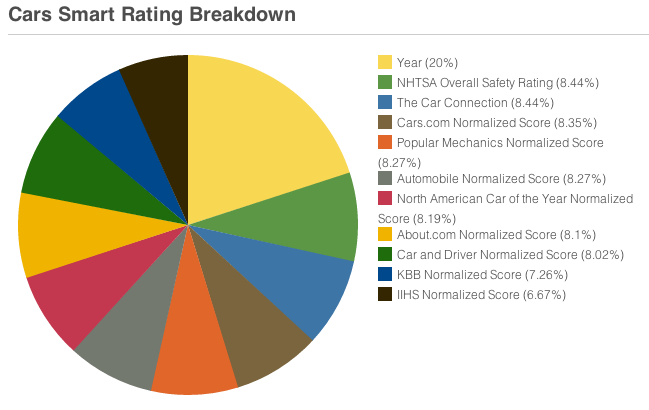
Notes
1. Year. The methodology makes one big assumption upfront: newer cars are fundamentally better than older cars. Regardless of performance benchmarks and miles per gallon, one can usually assume that a 2013 automobile will provide a better driving experience than its 1999 counterpart.
2. Safety. Tied for our next biggest slice of the pie, we assume most drivers care about safety. We incorporate both the National Highway Traffic Safety Administration’s (NHTSA) overall safety rating and the Insurance Institute for Highway Safety’s (IIHS) top safety picks into our score.
3. Experts. From here, things get a bit more involved. We’ve gone through a lengthy process of normalizing awards from nine respected car publications. Each presents their top picks a little differently, from “best in class” awards to “runners-up” to “honorable mentions” and so on. We won’t dive into the minutia of the calculation, but we’ve attempted to line up each publication’s awards in as apples-to-apples a fashion as possible. (And yes, we proudly include Car and Driver in this calculation.)
What results is a score that rewards a well-rounded car rather than an extreme one. If you’re a car enthusiast, you already know you value performance. If you’re a cost-conscious commuter, you’ll start with MSRP and gas mileage. As a result, our Smart Rating is best for deciding between those three, four, or five autos that already meet your personal preferences. (Note that the Smart Rating does not incorporate price. Like with most products, we assume consumers will weigh each car’s quality against its price tag.)
The Categories
For purposes of this story, we didn’t have the guts (read: stupidity) to rate pickup trucks next to coupes. Instead, we picked three popular car classes.
1. SUVs
2. Midsize Sedans
3. Midsize Luxury Sedans
Our apologies to soccer moms and dads around the world. Eventually, the van will have its day.
Finally, we’ve highlighted some non-gas-powered alternatives in every category. As automobile technology improves, the performance gap between gas, hybrid, diesel and electric cars will continue to decrease. If you’re a true tech geek, consider skipping gasoline for your next purchase.
To ensure the broadest, most comprehensive coverage from the experts, we only considered 2013 base models for this article.
SUVs
Gas-Powered Picks
With decent-for-their-class gas mileage, strong safety marks, and loads of awards from the experts, the Mazda CX-5, Ford Escape and Honda CR-V are our top 3 SUV / Crossover picks.
Alternative Fuel Pick
It’s a pricey midsize alternative to the compact, gas-powered SUVs above, but it’s far more affordable than hybrid luxury SUVs like the Lexus RX 450h ($46k), Audi Q5 Hybrid ($51k), or Porsche Cayenne S Hybrid ($70k). On the highway, you actually won’t see any mileage improvement over its gas-powered counterparts, but for city driving, the Highlander is noticeably better.
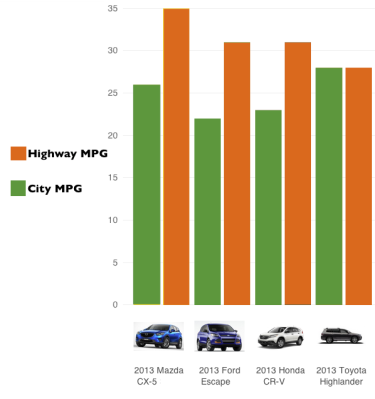
Midsize Sedans
Gas-Powered Picks
Dependable and affordable, the Honda Accord, Ford Fusion and Nissan Altima emerged as the top three gas-powered choices among the experts. The Accord in particular received very high marks all around.
Alternative Fuel Picks
As one would expect, each of these cars beats our gas-powered picks on MPG, both on the highway and in the city. For the aspiring European*, the Passat TDI offers a great diesel-based alternative, with excellent torque rather than high horsepower. Unless you’re part of an illegal street racing ring, consider investing in torque. Even if it isn’t as flashy a spec as horsepower, it’s much more important for driving around the city at low RPMs.
*Diesel is very popular in Europe.
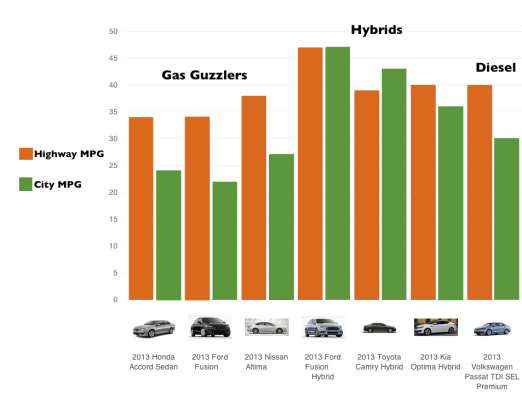
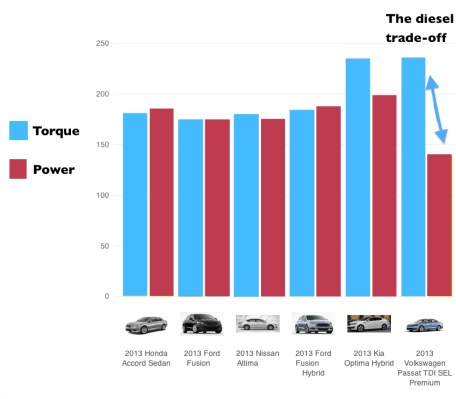
Consider this Volkswagen Jetta comparison. It does a good job illustrating the trade-offs between gas, hybrid and diesel. The Jetta S (gas-based) is the cheapest to buy initially, but fuel costs will add up over time. The Jetta Hybrid requires the largest upfront investment, but the better fuel efficiency might earn the money back in the long run. Finally, the Jetta TDI (diesel) lands in the middle, typical for its fuel type.

Midsize Luxury Sedans
Gas-Powered Picks
The Cadillac XTS emerges as our top midsize luxury sedan, with the Lexus GS 350 and Audi S6 close behind. In case you’re wondering: classic luxury manufacturers like BMW and Mercedes fared better in the compact luxury class.
Alternative Fuel Picks
When it comes to luxury sedans, the aspiring environmentalist now has several solid options. The selection of hybrid models continues to grow, the E350 BlueTEC offers an excellent diesel alternative, and the electric-powered Tesla Model S boasts a stunning combination of performance and fuel efficiency.
As always, the very best alternative fuel options aren’t cheap. You’ll have to pay over $60k for Tesla’s Model S…at least for now. Fortunately, the best technology has a habit of getting more affordable over time.
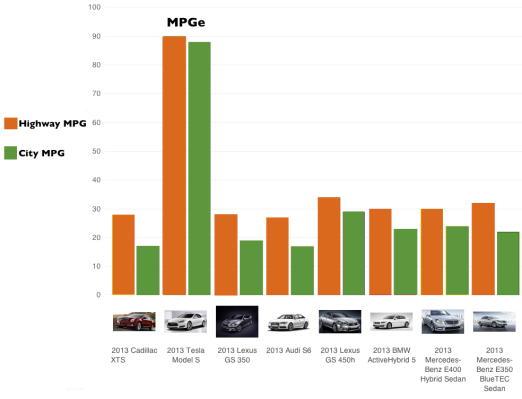
Tesla Model S gas mileage based on Miles per Gallon Equivalent (MPGe), a measure of the average distance traveled per unit of energy consumed.
This article was written for TIME by Ben Taylor of FindTheBest.

